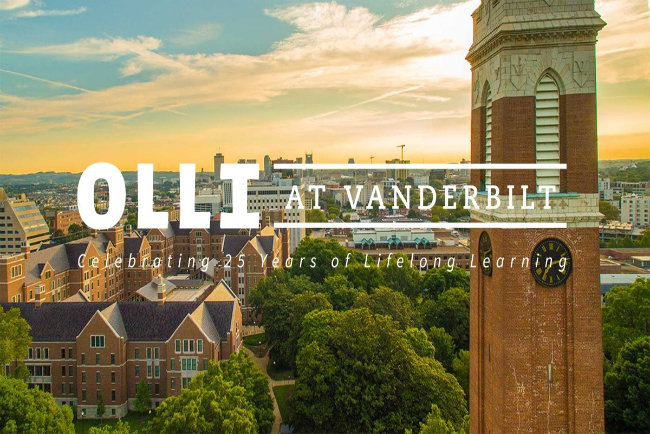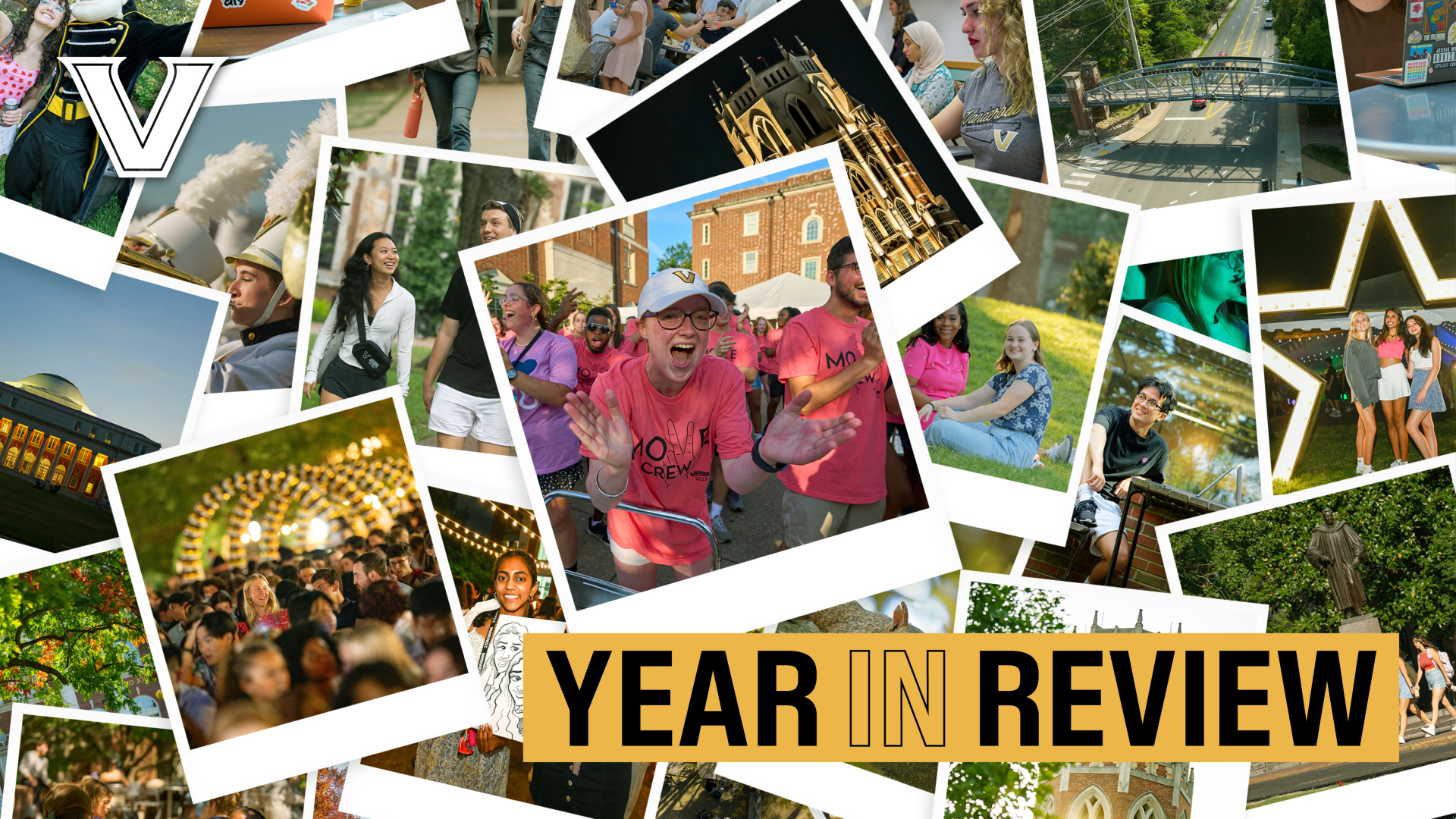Navigating information in the digital age, reading Shakespeare with film, memoir writing and meditative birding are just some of the classes offered by the Osher Lifelong Learning Institute at Vanderbilt this spring.
Other topics include the incarnational art of Flannery O’Connor, history of public health, beginners harmonica, steel drum band and choral singing. OLLI at Vanderbilt is open to all who are 50 and older.“Spring invites a renewed sense of discovery, and I am delighted to extend a warm invitation to our new term of intellectually stimulating classes at OLLI,” Norma Clippard, director of OLLI, said. “Whether you choose to participate in person or virtually, our curated courses promise to inspire and engage. Our dedicated instructors and welcoming community provide a supportive environment where lifelong learners can flourish and connect with others who share their passions.”
Registration for spring 2024 classes is open Feb. 12–March 8. Visit OLLI at Vanderbilt to register. Classes for the spring term begin on March 18.
- Consider the Birds of the Air, taught by Stacy Elliott, Cumberland-Harpeth Audubon Society board member. Designed to support learners’ exploration and application of the many facets of birdwatching, this course is best suited to those with some birding experience, though it is not a pre-requisite. In addition to birdwatching using apps like eBird, Merlin and Audubon, participants will hear from local experts to examine practices that protect birds. Students will meet for six Mondays beginning March 18, from 9 to 10:15 a.m., at the Warner Park Nature Center.
- Media Mindfulness: Navigating Information in the Digital Age, taught by Vanderbilt librarians Melissa Mallon, associate university librarian for teaching and learning, and Emily Bush, instruction and digital learning librarian. Navigating the ever-changing digital landscape can be daunting. This course is designed to provide practical tools for responsibly consuming, analyzing and engaging with (or disengaging from) an increasingly digital world. Topics will include analyzing media messages, navigating misinformation, digital privacy, AI literacies and more. Students will meet for five Mondays beginning March 18, from 10 to 11:15 a.m., online via Zoom. There will be no class on Monday, April 8.
- Meditative Birding, taught by Stacy Elliott. Explore the accessible and inclusive practice of meditative birding in this course, where participants engage in focused observation of birds’ features and behaviors. Through activities like nature journaling and shared reflection, participants will cultivate an intentional connection with nature, tapping into proven mental health benefits such as improved memory, decreased anxiety and increased happiness. Students will meet for six Mondays beginning March 18, from 10:45 a.m. to noon, at the Warner Park Nature Center.
- Beginners Harmonica, taught by Bronson Herrmuth, a teaching artist and multi-instrumentalist. Participants will learn and practice effective techniques for holding and playing the harmonica, including the “train” exercise to develop lung capacity and use of the diaphragm, the “pucker” technique for playing single notes, and how to create vibrato and “bend” notes. While having fun learning simple, familiar songs and playing music together, participants will be introduced to basic music theory and harmonica tablature. Harmonicas will be provided for all participants; no experience is required. Students will meet for six Tuesdays beginning March 19, from 9:30 to 10:45 a.m., at The Temple, 5015 Harding Pike.
- Choral Singing, taught by Mary Combs, choral director and educator. This course will instruct singers in blending tones, vocal techniques, singing in harmony, and musicianship, as well as prepare the participants to perform a few songs for an audience. The goal for the overall experience is to have fun while making beautiful music together. To benefit most from this course, attendance at each class is encouraged, barring signs of illness. Students will meet for seven Tuesdays beginning March 19, from 10 to 11 a.m., at The Temple, 5015 Harding Pike.
- Great Decisions 2024, taught by Keith Simmons, retired attorney and managing partner at Bass, Berry & Sims. This discussion-based course is built around Great Decisions, an annual publication of the Foreign Policy Association, a nonprofit organization dedicated to inspiring the American public to learn more about the world. The Great Decisions publication contains eight chapters, each focused on a different foreign policy issue or subject of international importance written by experts in the field. Participants will read and discuss the topics covered by the publication in each class. Students will meet for six Tuesdays beginning March 19, from 2 to 3:30 p.m., at St. George’s Episcopal Church.
- How to Write a Memoir, taught by Carole Webb Moore-Slater, an educator and community speaker. This creative nonfiction writing series provides practical information designed to motivate and inspire each participant to write a personal or family memoir one story at a time. Information includes organizational guidelines when planning a story and writing tips to bring characters to life as a story unfolds. Students will meet for eight Tuesdays beginning March 19, from 3 to 4:30 p.m., online via Zoom.
- Working Virtues: Essential Moral Skills for a Good Life, taught by Larry R. Churchill, Ann Geddes Stahlman Professor of Medical Ethics Emeritus at Vanderbilt University. This course will define and explore the moral skills that are most important for a good and happy life. Drawing from a wide range of sources—religious and secular, humanistic, poetic, literary, and scientific—the emphasis of the class will be on how these virtues function and the work they do for us. Exercises and practical engagement will be a part of each session. Students will meet for six Wednesdays beginning March 20, from 10 to 11:15 a.m., online via Zoom.
- Reading Shakespeare with Film – Part 2, taught by Russ Heldman, educator and community speaker. This course will explore the plays of William Shakespeare by use of the text and scenes from films depicting the plays. Students will see how reading Shakespeare with film aids in understanding the text and in enhancing the artistic experience. Of particular focus for Part 2 will be Shakespeare’s villains. Students will meet for six Wednesdays beginning March 20, from 2 to 3:15 p.m., online via Zoom.
- The Concerto: Relationships, Power and Mission in Music, taught by Mitchell Korn, retired senior lecturer at Blair School of Music. Dig deep into the musical, personal and spiritual relationships of the concerto, its creators and performers. This course will explore concertos of Mozart, Paganini, Chopin, Brahms and many others. Examine incredible music from 1785 to 2021 with engaging insights, videos, biographical images and conversation. Students will meet for six Thursdays, beginning March 21, from 2 to 4 p.m., online via Zoom.
- OLLI Steel Drum Band – Beginner, taught by Mat Britain, adjunct instructor in music at Blair School of Music. This musical journey to the Caribbean is a hands-on experience in which participants learn how to play the steel drums. Previous musical experience is helpful but not required. Students will meet for seven Sundays beginning March 24, from 11 a.m. to 12:15 p.m., at the Blair School of Music.
- OLLI Steel Drum Band – Intermediate, taught by Mat Britain. For students who have grasped the basics, this course helps to refine techniques on the steel pans. Students will work on slightly more difficult music and dive deeper into the culture of Trinidad and the steel band art form. Completion of the beginner course is a prerequisite unless the instructor grants permission through invitation or a short audition. Students will meet for seven Sundays beginning March 24, from 2:30 to 3:45 p.m., at the Blair School.
- OLLI Steel Drum Band – Advanced, taught by Mat Britain. This group, which often performs in the Vanderbilt Steel Bands Concert, approaches music that is more difficult with advanced playing techniques. Completion of the beginner and intermediate classes is a prerequisite unless the instructor grants permission through invitation or a short audition. Students will meet for seven Sundays beginning March 24, from 1 to 2:15 p.m., at the Blair School.
- The Incarnational Art of Flannery O’Connor, taught by Victor Judge, assistant dean for academic affairs, Vanderbilt Divinity School. Participants will read and discuss O’Connor’s canon short stories in which she draws portraits of aspiring writers who “scorn getting dusty” and whose preconceptions of writing are challenged by their encounters with the “flesh and blood” of reality. Selections that will be studied as representations of O’Connor’s incarnational artistry include: The Crop, The Partridge Festival, The Enduring Chill and Everything that Rises Must Converge. Students will meet for six Thursdays beginning March 28, from 9:30 to 10:45 a.m., at The Commons Center.
- History of Public Health, taught by Brandon Hulette, associate professor of military science at Vanderbilt University. Sanitation and hygiene issues have been a central aspect of much of American life from America’s founding fathers’ exceptional attention to matters of health to the recent pandemic response. Participants will explore the role of sanitation and public health in American society, including its history, the science of sanitation and the ongoing debate about the role of American institutions in the promotion of health, with special emphasis on Nashville. Students will meet for six Thursdays beginning March 28, from 11 a.m. to 12:15 p.m., at The Commons Center.
- The Durability of Shakespeare’s Hamlet, taught by Denice Hicks, artistic director of the Nashville Shakespeare Festival, and Marcia McDonald, professor of English emerita at Belmont University. Explore the meaning of Hamlet on the page and stage over the centuries and for an audience of 2024. Participants will consider not only what different eras and productions have revealed about the play, but what our fascination with the play reveals about us. Students will meet for two Fridays beginning April 5, from 10 to 11:30 a.m., at Nashville Public Television, 161 Rains Ave. The class will then attend the full production and talkback at Lipscomb University’s Collins Auditorium.
All class meetings will be on Central time. The Osher Lifelong Learning Institute is housed within Vanderbilt’s Division of Government and Community Relations. For more information, visit vanderbilt.edu/olli or call 615-343-0700.

